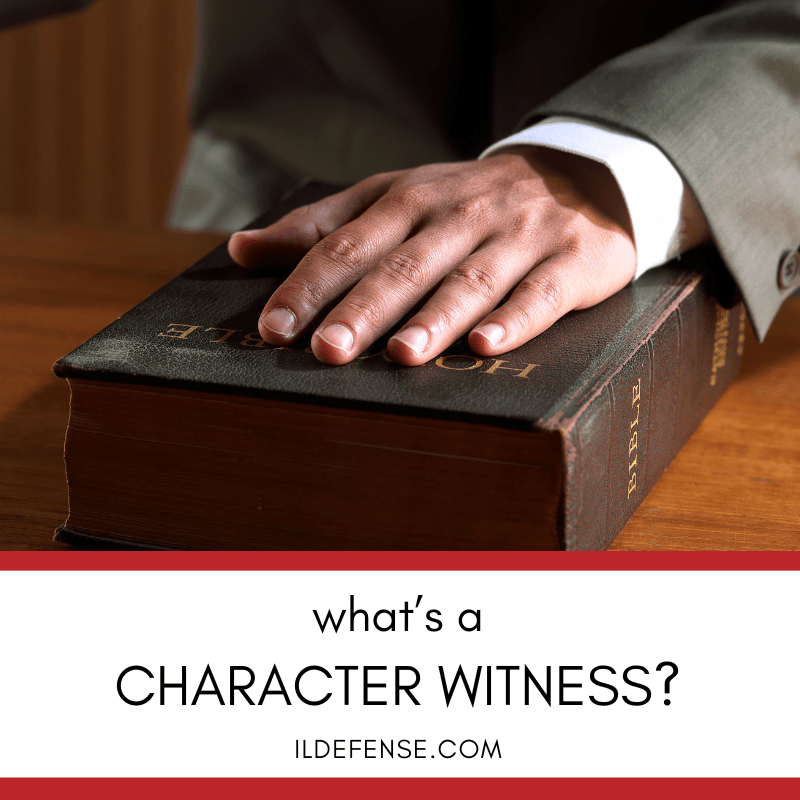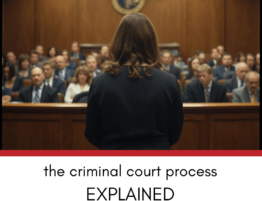
Character witnesses can play an important role in criminal trials by providing testimony about a defendant’s reputation, personality, and behavior. These witnesses are often called to testify during the sentencing phase or to support the defense’s argument. Whether you are facing a misdemeanor or a felony, character witnesses can help present a more complete picture of your life and circumstances. Under Illinois law, their testimony may help mitigate penalties or even influence the court’s decision. A Chicago criminal defense lawyer can determine whether calling a character witness is appropriate in your case.
What is a Character Witness in a Criminal Trial?
This guide explains the following:
- What a character witness is and how they are used in court
- When character witnesses are most effective
- The types of people who can serve as character witnesses
- How their testimony may impact a criminal trial
- How a lawyer determines the value of a character witness
Here’s an overview of the role of a character witness in criminal trials:
- Provide insight into the defendant’s character: Character witnesses testify about the defendant’s reputation, values, and behavior.
- Help humanize the defendant: Their testimony can show the court a more personal side of the defendant.
- Support sentencing arguments: These witnesses can be crucial during sentencing, especially in reducing penalties.
- Strengthen the defense’s case: Character testimony may counter negative perceptions created by the prosecution.
Now, let’s explore each of these points in more detail.
What a Character Witness Is and How They Are Used in Court
A character witness is someone who testifies about a defendant’s reputation, morality, and behavior, offering insight into their personality and lifestyle. Unlike fact witnesses, who provide testimony about specific events or evidence, character witnesses focus on the defendant’s general traits and actions.
In criminal trials, character witnesses are often called during the sentencing phase, but they may also testify earlier if the court allows it. Their role is to help the judge or jury see the defendant as a whole person, beyond the allegations or charges. For example, a character witness might discuss the defendant’s positive contributions to their community, commitment to their family, or consistent good behavior in everyday life.
When Character Witnesses Are Most Effective
Character witnesses are particularly effective in cases where the defendant’s actions were out of character or motivated by unusual circumstances. For example, if someone is accused of theft but has a long history of honesty and trustworthiness, a character witness could testify to support this.
They can also play a significant role in mitigating penalties during sentencing. If a defendant is convicted, the testimony of a character witness may persuade the court to impose a lighter sentence by emphasizing the defendant’s potential for rehabilitation and their value to society.
Types of People Who Can Serve as Character Witnesses
The most effective character witnesses are individuals who know the defendant well and can speak credibly about their positive qualities. Common examples include:
- Family members: Parents, siblings, or spouses who can share personal insights about the defendant’s character.
- Close friends: Longtime friends who can testify about the defendant’s reputation and behavior.
- Employers or colleagues: Supervisors or coworkers who can vouch for the defendant’s work ethic and dependability.
- Community leaders or mentors: Clergy, teachers, or coaches who have observed the defendant in positive roles.
The court typically evaluates the credibility of character witnesses based on their relationship with the defendant and their ability to provide meaningful testimony.
How Their Testimony May Impact a Criminal Trial
Character witness testimony can significantly influence the outcome of a criminal trial, especially during sentencing. A strong character witness may:
- Highlight the defendant’s remorse and willingness to change.
- Counter negative portrayals presented by the prosecution.
- Persuade the judge or jury to impose a lesser penalty.
However, the effectiveness of character testimony depends on the credibility of the witness and the relevance of their statements to the case. A skilled lawyer will carefully prepare character witnesses to ensure their testimony aligns with the defense strategy.
How a Lawyer Evaluates the Use of a Character Witness
A defense lawyer plays a crucial role in determining whether to include character witnesses in your case. They will evaluate the potential witness’s credibility, the relevance of their testimony, and how their statements fit into the overall defense strategy.
Your lawyer will also prepare character witnesses for court, helping them focus on key points and ensuring their testimony is clear and persuasive. In some cases, your attorney may decide that calling a character witness is unnecessary if other evidence or arguments are sufficient to support your defense.
FAQ About Character Witnesses in Criminal Trials
Check out these commonly asked questions about character witnesses in Illinois criminal trials. If you don’t see your question here, please call our office and we’ll find you the answers you need.
Can Character Witnesses Be Cross-Examined?
Yes. The prosecution has the right to cross-examine character witnesses to challenge their credibility or the relevance of their testimony.
Are Character Witnesses Allowed in All Criminal Trials?
Not always. The court determines whether character witnesses can testify, and their testimony must be relevant to the case.
Can a Character Witness Testify About Past Crimes?
No. Character witnesses are generally limited to discussing the defendant’s reputation and behavior, not specific incidents unless directly relevant to the case.
Do Character Witnesses Make a Difference in Sentencing?
Yes. In many cases, character witness testimony can lead to reduced penalties by showing the defendant’s potential for rehabilitation.
How Does a Lawyer Prepare a Character Witness?
A lawyer will review the witness’s statements, help them focus on key points, and ensure they are prepared to respond to cross-examination.
Character witnesses can provide valuable support in a criminal trial by offering insight into a defendant’s positive traits and personal circumstances. Understanding how their testimony fits into your case under Illinois law is essential to making the most of this strategy. An experienced Chicago criminal defense lawyer can determine when to use character witnesses and how to prepare them to make the greatest impact on your defense.
Do You Need to Talk to an Attorney?
If you’ve been accused of a crime, we may be able to help you – and don’t worry: It’s completely confidential. Call us at 847-920-4540 or fill out the form below to schedule your free, private consultation with an experienced and skilled Chicago criminal defense attorney now.
Contact Us
"*" indicates required fields









